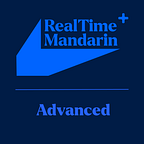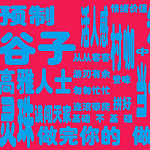Welcome to RealTime Mandarin—a multimedia resource to immerse you in the latest Chinese language trends, inspire you to practice and improve your Mandarin every week, and empower you to communicate with confidence.
Subscribe now to get the next issue straight to your inbox!
‘Eating people’ (吃人 chī rén) is what some companies in China are accused of doing: they exploit their employees.
It’s from a line in Lǔ Xùn’s (鲁迅), A Madman's Diary (狂人日记 kuángrén rìjì), published in 1918, which goes as follows:
我翻开历史一查,这历史没有年代。歪歪斜斜的每页上都写着“仁义道德”几个字,我横竖睡不着,仔细看了半夜,才从字缝里看出来,满本上都写着两个字“吃人"!
As I look through the pages of history, I see there are no dates. On each page, written messily, are the characters, ‘benevolence and morality’. I can’t sleep. I read into the night. Finally, I find hidden between the characters across the page, the words, ‘eating people’.
Times have changed since Lu Xun made that observation more than 100 years ago, but the culture of ‘eating people’ in China has not, according to one comment on social media this week:
吃人的事实,从来没有变过,历朝历代都是如此 - The reality of companies exploiting their employees is nothing new. It’s been the same throughout history.
Two of China’s biggest tech companies, Tencent and Bilibili, have recently been accused of ‘eating people’, abusing and exploiting their staff.
So that’s is what we discuss this week.
CONVERSATIONS WITH CONSUMING
Interview with Zhang Yifei
Two weeks ago a 25-year-old programmer at Tencent, Zhāng Yìfēi 张义飞, became an Internet sensation after standing up to his bosses at the company. He announced in an internal group chat that he was quitting his job, which then went viral on social media.
If 20-hour days is what the company wants, he wrote, ‘I’ll resign tomorrow’.
36Kr interviewed Zhang this week (in Chinese). He talks more about the overtime culture at Tencent, and why he dared to take on his company in such a public way - he already had another job lined up.
There are some excellent words in his description of life as a working person at Tencent.
Useful words
卡 kǎ - stop, block
什么时候离职的?有人卡你吗 - When did you leave your job? Did they try to stop you?
剥削 bō xuē - exploit
加班严重、996工作制、互联网巨头压榨剥削员工等话题再次被拿来讨论 - Topics such as serious overtime, the 996 work system, and the exploitation of employees by Internet giants are being discussed again.
底气 dǐ qì - confidence, back up
自己已经提前拿到其他公司的offer,比较有底气 - I already had an offer from another company, so I was relatively confident about doing it.
忌惮 jì dàn - fear, be afraid of
如果一些互联网大厂因此忌惮、不录用我,我正好也不想去这种加班严重的地方 - If some big Internet companies are afraid to hire me, that’s fine by me. I also don't want to work in a company with such heavy overtime.
手软 shǒu ruǎn - ‘soft hand’, forgiving
不要特立独行,搞小团体,否则他不会手软 - Do not march to a different beat or form small cliques. He will come down hard on this kind of behaviour.
打硬仗 dǎ yìng zhàng - fight a hard war
张小龙管理下的企业微信,经常会强调用小而精的团队打硬仗 - The company Wechat, under Zhang Xiaolong’s management, would often emphasise using a small and efficient team to work on tight deadlines.
Note: a common phrase used in Chinese companies when a team is working intensely on a project or against a ridiculous deadline.
Related: 打胜仗 dǎ shèngzhàng - win a war
喊口号 hǎn kǒuhào - shouting slogans
但大家普遍的看法是,不想看到空洞地喊口号,只想看到具体行为 - The general view is they don’t want to see people shouting empty slogans. They want to see action.
Idioms
初出茅庐 chūchū máolú - ‘just come out of the thatched cottage’; inexperienced, wet behind the ears
但对于大众而言,互联网巨头和初出茅庐的应届生,相比较下毕竟力量悬殊 - There’s no comparison between the power of the big internet companies and graduate employees with no experience.
More: 悬殊 xuán shū - disparity
昏昏沉沉 hūnhūn chénchén - feeling sleepy
来这里入职两个月,感到昏昏沉沉,记忆力下降很多 - I’ve been here for two months. I feel tired and my memory has declined a lot.
热火朝天 rèhuǒ cháotiān - ‘hot fire face sky’; vigorously, with energy
到点的时候,差不多一半人还没走,都在热火朝天地讨论工作 - When it was time to finish at the end of the day, around half of the team stayed behind to talk energetically about their work.














